|
|
|
Sort Order |
|
|
|
Items / Page
|
|
|
|
|
|
|
| Srl | Item |
| 1 |
ID:
155825
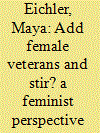

|
|
|
|
|
| Summary/Abstract |
This article examines how scholarship on veterans has begun to incorporate gender as a relevant category of research. Drawing on feminist theory, it identifies different approaches to gender within the field of veterans studies and suggests avenues for advancing this aspect of research. The vast majority of gender research on veterans treats gender as a descriptive category or variable through a focus on female veterans or gender differences. This article argues that research on veterans can be enriched by employing gender as an analytical category. Focusing on gender norms, power and inequality based on gender, and the intersections of gender with other categories of social difference opens up new questions for gender research on veterans. This kind of broader, analytical conceptualization of gender reveals the ways in which gender shapes the transition to civilian life for all veterans and how veterans policies and programs impact gender relations.
|
|
|
|
|
|
|
|
|
|
|
|
|
|
|
|
| 2 |
ID:
124070


|
|
|
|
|
| Publication |
2013.
|
| Summary/Abstract |
Different countries have varying definitions of the word "veteran," which in turn influence the benefits that ex-Service personnel receive. However, public opinion does not necessarily reflect official definitions. This article seeks to identify whether characteristics by which UK ex-Service personnel self-identify as veterans are aligned with official policy/public opinion, and which factors are associated with self-identification as a veteran. This article utilizes data from a structured telephone interview survey of UK Armed Forces personnel. All those who had left the military by the time of interview (n = 202) were asked whether they considered themselves to be a veteran. Their responses were recorded and analyzed. Only half of the sample considered themselves to be veterans. Definitions used by UK ex-Service personnel do not align with the official UK government definition or public perceptions of "veterans," which tend to focus on older veterans and/or those who served in both World Wars.
|
|
|
|
|
|
|
|
|
|
|
|
|
|
|
|
| 3 |
ID:
146885


|
|
|
|
|
| Summary/Abstract |
This study examines partnerships between the military and local communities by exploring communication channels of the U.S. military and civilian agencies that provide services to transitioning military members. This article reports on a study conducted in 2013 in the Hampton Roads, Virginia area, designed to determine the degree to which the military enters into partnerships with civilian service providers. We find that navy agencies in Hampton Roads do work with community partners, but the military is more directive than one might imagine in a true partnership, leading to “uneasy” partnerships. Additionally, there are important structural and organizational barriers that prevent true partnerships from developing between navy agencies and the community providers.
|
|
|
|
|
|
|
|
|
|
|
|
|
|
|
|
| 4 |
ID:
189928


|
|
|
|
|
| Summary/Abstract |
Research suggests that marginalized groups can use military service to win greater governmental and social acceptance by using civic republican rhetoric, however, conditions in which claims-making rhetoric is coercive are underspecified. Because rhetorical effectiveness requires sympathetic ears, we examine the influence of (1) expectations and political efforts of marginalized group members seeking greater acceptance, (2) whether majority group economic status is outpacing marginalized groups seeking improved treatment, and (3) whether marginalized groups have influential military veterans from majority groups as allies. We apply these factors to explain the claims-making failure of German Jews following the First World War and the success of African Americans after the Second World War. From the African American case, we also conclude that military service led to greater socio-political inclusion and rights based on development of future political actors through leadership development processes and inter-group contact, especially regarding Presidents Truman and Eisenhower.
|
|
|
|
|
|
|
|
|
|
|
|
|
|
|
|
| 5 |
ID:
160622
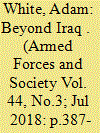

|
|
|
|
|
| Summary/Abstract |
Through the lens of veterans studies, we know a great deal about the fate of those soldiers who have recently returned home following a period of deployment in Iraq and Afghanistan, yet counterintuitively we know nothing about the plight of the private military contractors who worked alongside them. Addressing this blind spot, the article explores the socioeconomic trajectories of “private military veterans” from a life-course perspective. Specifically, it addresses three questions regarding their status in the civilian labor market. What occupations do they work in? To what extent do they work in similar occupations to public military veterans? To what extent do they work in similar occupations to the general population? Focusing on the U.K. case, it reveals that private military veterans are significantly overrepresented in the “protective service occupations,” where they primarily work in the private security industry, and offers a multilayered explanation for this distinctive clustering effect.
|
|
|
|
|
|
|
|
|
|
|
|
|
|
|
|
| 6 |
ID:
188791


|
|
|
|
|
| Summary/Abstract |
Prior research into military–civilian transition has suggested that the Prison Service may be a popular destination for Armed Forces leavers, but the experience of former military personnel within the prison system as prison staff (rather than as Veterans in Custody) has so far been overlooked. As a result, we know very little about their route into prison work. This article reports on a UK study investigating the experience of prison personnel who have previously served in the military and presents the first set of empirical evidence addressing these critical questions. Whilst our findings mirror prevailing assumptions of a relatively seamless transition to post-military careers (and, in particular, those within Protective Service Occupations), few had intended a career in prison work specifically. Such trajectories may influence personal military–civilian transitions, as well as job performance in prison work and, by extension, the everyday lives of prisoners and other prison staff.
|
|
|
|
|
|
|
|
|
|
|
|
|
|
|
|
| 7 |
ID:
160095


|
|
|
|
|
| Summary/Abstract |
Insomnia is prevalent among Veterans with post-traumatic stress disorder (PTSD), it exacerbates PTSD symptoms, and it contributes to impaired functioning and quality of life. To improve treatment outcomes, it is important to identify risk factors for insomnia and sedative-hypnotic use. Classification and regression trees and logistic regression models were used to identify variables associated with insomnia or sedative-hypnotic use. Key findings include low insomnia diagnosis rates (3.5–5.6%) and high rates of sedative-hypnotics (44.2–49.0%). Younger Veterans and those without a breathing-related sleep disorder (BRSD) were more likely to receive an insomnia diagnosis. Veterans with greater service connection and those with an alcohol/substance use disorder were more likely to be prescribed sedative-hypnotics. Interaction terms may have identified potential groups at risk of being under-diagnosed with insomnia (i.e. non-black Veterans with psychiatric co-morbidity, black Veterans without psychiatric co-morbidity) as well as groups at risk for sedative-hypnotic use (i.e. younger Veterans without BRSD). In sum, Veterans with PTSD have high rates of sedative-hypnotic use despite minimal evidence they are effective. This is counter to recommendations indicating behavioral interventions are the first-line treatment. Policy changes are needed to reduce use of sedative-hypnotics and increase access to behavioral insomnia interventions.
|
|
|
|
|
|
|
|
|
|
|
|
|
|
|
|
| 8 |
ID:
174831
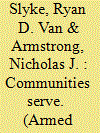

|
|
|
|
|
| Summary/Abstract |
Military veterans and their families face a multiplicity of challenges once they transition from service. Even though more American private and public-sector organizations are engaged in studying the needs of veterans and their families through need assessments, few assessments are comprehensive analyses of the challenges they face. This systematic review of 61 need assessments from 2007-2018 in the United States summarizes findings on 18 veterans issues. While most studies addressed issues relating to accessing U.S. Department of Veterans Affairs health and benefit services, mental health, employment, and homelessness, gaps in the literature emerged, particularly regarding ethnic and sexual minority, rural and elderly veterans, and National Guard/Reserve servicemembers. Large cities and states with varying degrees of military presence were frequent regions of study, with national think tanks, nonprofit organizations, and public universities conducting most need assessments. Future assessments should address persistent inequities in coverage among communities and topics of study using mixed-method research and survey design.
|
|
|
|
|
|
|
|
|
|
|
|
|
|
|
|
| 9 |
ID:
183832


|
|
|
|
|
| Summary/Abstract |
Corporate privatization of security has generated a neoliberal iteration of an old profession: the private military contractor. This development has revolutionized security policies across the globe while reviving old patterns of inequality. Following neoliberal logic, outsourcing fosters two types of employment: the exploitative and the exclusive. The first refers to low-status individuals hired en masse to perform menial labor; the second refers to experts who perform functions central to the employer’s mission. We contribute to this discussion by focusing on the qualifications of a different subsample of this industry: American contractors who died while performing military and security functions in Iraq. We assert that such American employees directly engaged in mission-essential combat and security functions better fit the employment category of an exclusive, expert sector at the core of the private military industry.
|
|
|
|
|
|
|
|
|
|
|
|
|
|
|
|
| 10 |
ID:
173120


|
|
|
|
|
| Summary/Abstract |
Our research, based on a sample of 500 veterans currently studying at Israeli colleges and universities, suggests that certain aspects of military service are associated with greater entrepreneurial intentions. Specifically, the desire to engage in entrepreneurship is higher among veterans with command experience than veterans without. Similarly, veterans of technological units generally express greater entrepreneurial interest than veterans of combat units. A comparison of commissioned and noncommissioned officers yields curious results and offers a possible direction for further investigation. Although Israel is among the few countries that maintains a mandatory draft, the general applicability of these findings to countries with volunteer forces is discussed.
|
|
|
|
|
|
|
|
|
|
|
|
|
|
|
|
| 11 |
ID:
100078


|
|
|
|
|
| Publication |
2010.
|
| Summary/Abstract |
Despite its social and political importance, veterans' policy is an overlooked subject in the field of civil -military relations. This article aims to discuss the theoretical problems of studying veterans' policy. It also proposes analysis of veterans' policy in Russia. The aim of the theoretical review is to underline the limits of traditional ways of viewing veterans' policy, which consider veterans' policy as a consequence of the development of military institutions. The article stresses the importance of taking into account the effect of societal factors in explaining veterans' policy. An examination of the Russian case demonstrates the historical development of an exclusive veterans' policy, including the construction of the privileged position for veterans of the World War II. It also analyses the changes of veterans' policy after the Soviet Afghan War of 1979 -89. Finally, the article highlights the principles of contemporary veterans' policy in Russia and explains why it cannot be changed without reconfiguration of civil-military relationships.
|
|
|
|
|
|
|
|
|
|
|
|
|
|
|
|
| 12 |
ID:
173760


|
|
|
|
|
| Summary/Abstract |
The digital divide's implications on health inequality among American Military veterans has been discussed extensively in research; however, it remains unclear what is the association between Internet usage and health specifically among Veterans. We examine this question by addressing the growing digital gaps in the veteran population, looking at the association of Internet use and self-reported health. Using the National Survey of Veterans we find that compared to those who use the Internet daily, those who use the Internet less frequently have significantly higher odds of reporting “fair” or “poor” self-rated health. The significant association remained when demographic, socioeconomic, and military factors were controlled. While our results indicate that veterans that use the Internet more frequently report more favorable self-reported health, given our data we are unable to distinguish a causal relationship. We conclude by discussing potential policy interventions, targeting helping those who are left behind.
|
|
|
|
|
|
|
|
|
|
|
|
|
|
|
|
| 13 |
ID:
103234
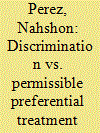

|
|
|
|
|
| Publication |
2011.
|
| Summary/Abstract |
This essay analyzes the allocation policies enacted by Haifa University over its dormitories. While seemingly a trivial case, it is actually a key example of an ongoing legal and social struggle between Arab and Jewish citizens of Israel. The policy provides preferential treatment for veterans of IDF and national service. Adalah challenged this policy in an Israeli court which accepted the petition. However, the legislation was later changed to allow such preferential treatment. This article examines two issues: national service for Arabs, and the preferential treatment practised by Haifa University I will argue that both opening national service for Arabs, and the policy of Haifa University are justified, however, the analysis will demonstrate the complexity of both subjects, and the article concludes with suggestions for both issues.
|
|
|
|
|
|
|
|
|
|
|
|
|
|
|
|
| 14 |
ID:
094074
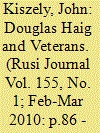

|
|
|
|
|
| Publication |
2010.
|
| Summary/Abstract |
Douglas Haig returned to Britain in 1919 after the end of the Great War to no grand position. He became a much-maligned character in the historiography in the decades afterwards. But contrary to caricature of him as callous and uncaring, Haig actually spent the post-war years labouring on behalf of his men. He was instrumental in the founding of The Royal British Legion, and lobbied ceaselessly for better treatment for veterans of all ranks and class.
|
|
|
|
|
|
|
|
|
|
|
|
|
|
|
|
| 15 |
ID:
187112
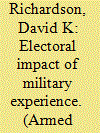

|
|
|
|
|
| Summary/Abstract |
The belief that a military veteran candidate receives an electoral benefit at the polls based on a history of military service remains a widely held assumption in American politics. However, this assumption of a veteran electoral bonus has rarely been studied by scholars and the limited literature displays mixed results. This article presents the findings of a new study that addresses the mixed results in the literature and presents evidence that demonstrates that certain types of military veteran candidates do gain a veteran bonus in congressional elections. This advantage over nonveterans is conditioned by party, the type of race, and the nature of military service. By analyzing general election races for the United States Senate over 34 years (1982–2016), the study uncovers support for Democratic candidates with military service receiving an electoral bonus at the polls. This electoral bonus is most widely enjoyed by Democratic veterans in open Senate races and with experience in deployed warzones. The key findings suggest that previous conclusions in the literature with respect to establishing a veteran bonus in congressional elections should be reexamined to expand the time period of analysis, restructure the characterization of military experience beyond a binary variable, and include both House and Senate elections.
|
|
|
|
|
|
|
|
|
|
|
|
|
|
|
|
| 16 |
ID:
148253


|
|
|
|
|
| Summary/Abstract |
Charity watchdogs and the media level serious allegations of mismanagement of funds at charities serving former and current members of the U.S. armed services, affecting service recipients, families, donors, grantors, foundations, and taxpayers. To examine these allegations, we use two approaches from the literature to assess nonprofit financial effectiveness: the organization’s ability to gain resources and to sustain activities. We mirror the approach of charity raters, whose measures are widely available to the public. Using GuideStar/Internal Revenue Service data, we compare fund-raising expenditures, assets, and financial sustainability of large national military and veterans nonprofits to a random sample of national nonprofits. We apply propensity score matching and compare organizations similar in size, age, and other factors. We find little difference between military and veterans charities and other nonprofits and provide an improved method for evaluating the financial health of nonprofits across academic discipline, nonprofit field of service, and within or among countries.
|
|
|
|
|
|
|
|
|
|
|
|
|
|
|
|
| 17 |
ID:
085364


|
|
|
|
|
| Publication |
2009.
|
| Summary/Abstract |
This article examines the effect of prior military service on hiring for entry-level jobs in a major metropolitan labor market. The research employs an audit method in which resumes differing only in the presentation of military experience versus civilian work experience are faxed in response to an advertised position. Results suggest that employers exhibit preferential treatment of black military veterans with transferable skills over black nonveterans. Veterans with traditional military experience in the combat arms do not experience preferential treatment by employers, regardless of racial/ethnic background. These findings suggest a possible mechanism generating the postmilitary employment benefit among blacks found in prior observational studies. A veteran premium in hiring may stem from the concentration of blacks in military occupational specialties with a high degree of civilian transferability, combined with employer preferences for military veterans with such work experience over their nonveteran peers.
|
|
|
|
|
|
|
|
|
|
|
|
|
|
|
|
| 18 |
ID:
160092
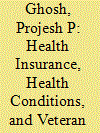

|
|
|
|
|
| Summary/Abstract |
The utilization of health care services by veterans has received much attention in recent years. However, the impact of the large array of factors affecting the veterans’ demand for health care services remains understudied. These factors include individual socio-demographic and economic characteristics, the availability of various sources of health insurance, and the prevalence of medical conditions. We use public data to analyze how veterans’ utilization of health care services varies with these factors. We also analyze how the reliance on VA services varies when alternative sources of health insurance are available to veterans. Based on the estimated relationships, we use a micro-simulation model to forecast future health care utilization, both inside and outside of VA.
|
|
|
|
|
|
|
|
|
|
|
|
|
|
|
|
| 19 |
ID:
169100


|
|
|
|
|
| Summary/Abstract |
Commenters often criticize the mass media for providing audiences a narrow and inaccurate representation of U.S. military veterans. This study examined the claim by researching how regional news publications in the 50 states represented veterans on Twitter. A quantitative content analysis documented the presence or absence of characteristics in 1,460 tweets that employed the terms veteran or veterans. Data were examined using cluster analysis. Three frames emerged. The most prevalent frame, labeled charity, highlighted instances in which veterans received assistance from charitable organizations and others. The second frame, hero, contained references to honor, World War II, and content that would elicit pride from audience members. The third frame, victim, highlighted the mistreatment of veterans by the military and/or society, mental health issues, politics, and the Gulf War. Results suggest U.S. news consumers are provided a narrow representation of what it means to be a veteran.
|
|
|
|
|
|
|
|
|
|
|
|
|
|
|
|
| 20 |
ID:
168208


|
|
|
|
|
| Summary/Abstract |
In his seminal study of the changing nature of warfare between Agincourt and the Somme, military historian John Keegan proposed that future historians might consider combatants’ emotions in their assessments of the impact and nature of conflict. Recent years have witnessed the emergence of the history of emotions as an analytical approach, but rarely, if ever, is this directed toward the study of military history, far less the history of insurgencies and counter-insurgencies. This paper examines America’s civil war (1861–1865) as a case study of the ways in which an emotional history approach might illuminate not the physical experiences of but rather the immediate and longer-term reactions to counter-insurgency conflict through a focus on one specific individual, the future Supreme Court Justice Oliver Wendell Holmes, Jr. It proposes that Holmes, whilst not a man of the ranks, nevertheless can reveal the wider ramifications of civil war and its emotional impact, both individually and culturally. As a relatively limited internecine war, one not fought by professional armies but by volunteer forces, America’s civil war highlights the ways in which the soldier’s response points us toward the kind of emotional revolution that has, to date, mainly been located within the European nations.
|
|
|
|
|
|
|
|
|
|
|
|
|
|
|
|
|
|
|
|
|